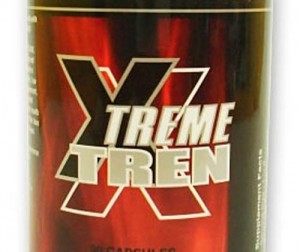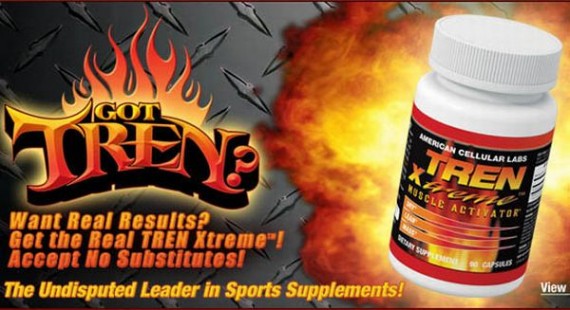
FDA Special Agent Jeff Novitzky, the agent who has become the face of the federal government witch-hunt against steroid users in professional sports during the BALCO scandal, has move his attention to investigating dietary supplement companies suspected of selling designer anabolic steroids.
Novitzky’s latest steroid investigation targeted two popular products sold and marketed as dietary supplements, “Tren Xtreme” and “Mass Xtreme”. These products were manufactured by American Cellular Labs Inc. (ACL) and sold exclusively through Max Muscle Sports Nutrition (MMSN) stores and via the ACL website (“Two Dietary Supplements Said to Contain Steroids,” July 23).
The exact nature of the business relationship between ACL and MMSN is unclear. Maurice Sandoval, the owner of the Max Muscle San Francisco franchise and the Regional Marketing Director for Max Muscle, was identified as the chief executive of ACL in a government affidavit. Sandoval told the New York Times that he sold ACL in 2008. ACL, Max Muscle San Francisco, and Sandoval’s residence were targets of search warrants executed on July 23, 2009.
The FDA investigation did not involve any steroid contaminants or undisclosed anabolic steroids. Federal investigators specifically targeted the openly listed ingredients in Tren Xtreme and Mass Xtreme commonly referred to as “Tren” and “Madol”, respectively.
“Tren” in Tren Xtreme is also known by the following synonyms: “4-estra”, 19-Norandrosta-4,9-diene-3,17-dione and Estra-4,9-diene-3,17-dione.
Madol in Mass Xtreme is also known by the following synonyms: desoxymethyltestosterone, “DMT” and 17a-Methyl-etioallocholan-2-ene-17b-ol.
The following information from the “Affidavit of Special Agent Jeff Novitzky in Support of Application for Search Warrant” may be of special interest to certain manufacturers, distributors and retailers of similar products in the sports nutrition segment of the dietary supplement industry.
1. FDA Special Agent Jeff Novitzky is fully aware of the existence of MANY similar products and clones produced by SEVERAL additional supplement companies. He has also been involved in other (apparently non-publicized) raids of supplement companies producing similar products.
I am aware that over the last several years, several products labeled as “dietary supplements” containing the substance “Madol” have become available on the market. […]
There are numerous purported dietary supplements containing “Tren” that are currently available on the market. I have participated in search warrants of companies that have sold purported dietary supplements containing “Tren” and I am familiar with common avenues ofsupply and distribution.
2. Owners of supplement companies producing similar products are cooperating with Special Agent Jeff Novitzky in his steroid investigation targeting the supplement industry.
As stated earlier in the experience section of this affidavit, I have personally been involved in several investigations concerning “dietary supplements” that are actually drugs, including steroids. Specifically, I have participated in the execution of search warrants on companies selling products similar to those offered by ACL. I have reviewed a portion of the evidence collected during these searches, and I have interviewed and developed contacts and informants within the industry, including owners of purported “dietary supplement” companies that have distributed products containing unapproved drugs and “anabolic steroids” identical to those sold by ACL.
3. Jeff Novitzky asserts that “Tren” and “Madol” are legally classified as “anabolic steroids” under his interpretation of federal law.
[B]ased upon the FDA’s FCC findings that ACL’s “Tren Xtreme” and “Mass Xtreme” contained “Tren” and “Madol,” respectively, and upon the DEA analyses that show that these drugs meet the current definition of an “anabolic steroid” under federal law, I believe that there is .probable cause to believe that the distribution of ACL’s “Tren Xtreme” and “Mass Xtreme” violates the Controlled Substance Act as defined in paragraphs 17 and 18 of this affidavit.
4. The government may be likely to crack down harshly on supplement companies that ignored the DEA’s proposed rule regarding “Madol” and “Tren” over 15 months ago.
I am aware that on April 28, 2008, the Drug Enforcement Adminstration (DEA) listed a proposed rule in the publicly-filed Federal Register entitled “Classification of Three Steroids as Schedule III Anabolic Steroids Under the Controlled Substances Act.” I am also aware that this proposed rule listing is still in a proposed status and has not yet been made final. The proposed rule includes both “Tren” and “Madol” as steroids to be classified as Schedule III Anabolic steroids. The proposed rule summarizes DEA studies that both “Madol” and “Tren” are chemically and pharmacologically related to testosterone and are not estrogens, progestins, corticosteroids, or dehydroepiandrosterone.
5. Jeff Novitzky’s assertion that “Madol” and “Tren” are legally classified as Schedule III Controlled Substances (anabolic steroids) is based upon (a) the testimony of FDA pharmacologist James Tolliver and (b) the April 28, 2009 DEA proposed rule published in the Federal Register.
In particular, I have communicated with Dr. James Tolliver, a chemistry expert presently with the FDA but previously employed by the DEA, who perfonned a scientific analysis on these substances while he was with the DEA and found that both “Madol” and “Tren” are chemically and pharmacologically related to testosterone (and also are not estrogens, progestins, corticosteroids, or dehydroepiandrosterone). Based upon Dr. Tolliver’s infonnation and 21 U.S.C. S02(41)(A), there is probable cause that “Madol” and “Tren” are anabolic steroids and are presently illegal.
[…]
I have been informed by an FDA chemistry expert, Dr. James Tolliver, that “Tren” is a synthetic compound as well, due to its double bond between the carbon atoms 9 and 1 0, something that is not found in nature.
[…]
I am aware that over the last several years, several products labeled as “dietary supplements” containing the substance “Madol” have become available on the market. I have been informed by an FDA expert, Dr. James Tolliver, that “Madol” is a synthetic compound not found in nature.
[…]
While the proposed rule proposes to specifically classify and list these chemicals as steroids under Schedule III ofthe CSA based upon the DEA studies that show they meet the criteria for definition of an “anabolic steroid” under the Steroid Control Act of2004, as outlined in paragraph 17 of this affidavit, the proposed rule also indicates that the steroids meet the defmition of “anabolic steroids” under current federal law.
It is important to note that DMT and tren were NOT legally defined as an anabolic steroid under the Anabolic Steroid Control Act of 1990 and 2004. Most supplement industry experts disagree with Jeff Novitzky’s assertion that tren or Madol can currently be legally classified as a controlled substance (anabolic steroid).
William Llewellyn, author of the authoritative anabolic steroid reference manual Anabolics, reported that there is no known source for tren in nature but considers is a misbranded drug and not an anabolic steroids.
Since the designer steroid tren is not natural, it is considered a misbranded drug under federal law.
Patrick Arnold, most recently the chemist at Ergopharm and Proviant Technologies, is critical of Novitzky’s assertion that the products are legally defined as “anabolic steroids.
novitzky claims that "tren" and "madol" should be considered classified as controlled right now, TODAY. that is never gonna stand up
— Patrick Arnold (@pa1ad) July 24, 2009
“Novitzky claim is that “tren” and “madol” should be considered classified as controlled right now, TODAY… That is never gonna stand up.” Arnold wrote.
Special Agent Jeff Novitzky has a history of asserting that misbranded and unapproved new drugs are “anabolic steroids” when that may not be legally accurate. Novitzky repeatedly referred to tetrahydrogestrinone (THG) as an “anabolic steroid” in interviews and testimony related to the BALCO case. The Controlled Substances Act was amended to included THG much later with the passage of the Anabolic Steroid Control Act of 2004.

About the author
Millard writes about anabolic steroids and performance enhancing drugs and their use and impact in sport and society. He discusses the medical and non-medical uses of anabolic-androgenic steroids while advocating a harm reduction approach to steroid education.

Leave a Reply
You must be logged in to post a comment.